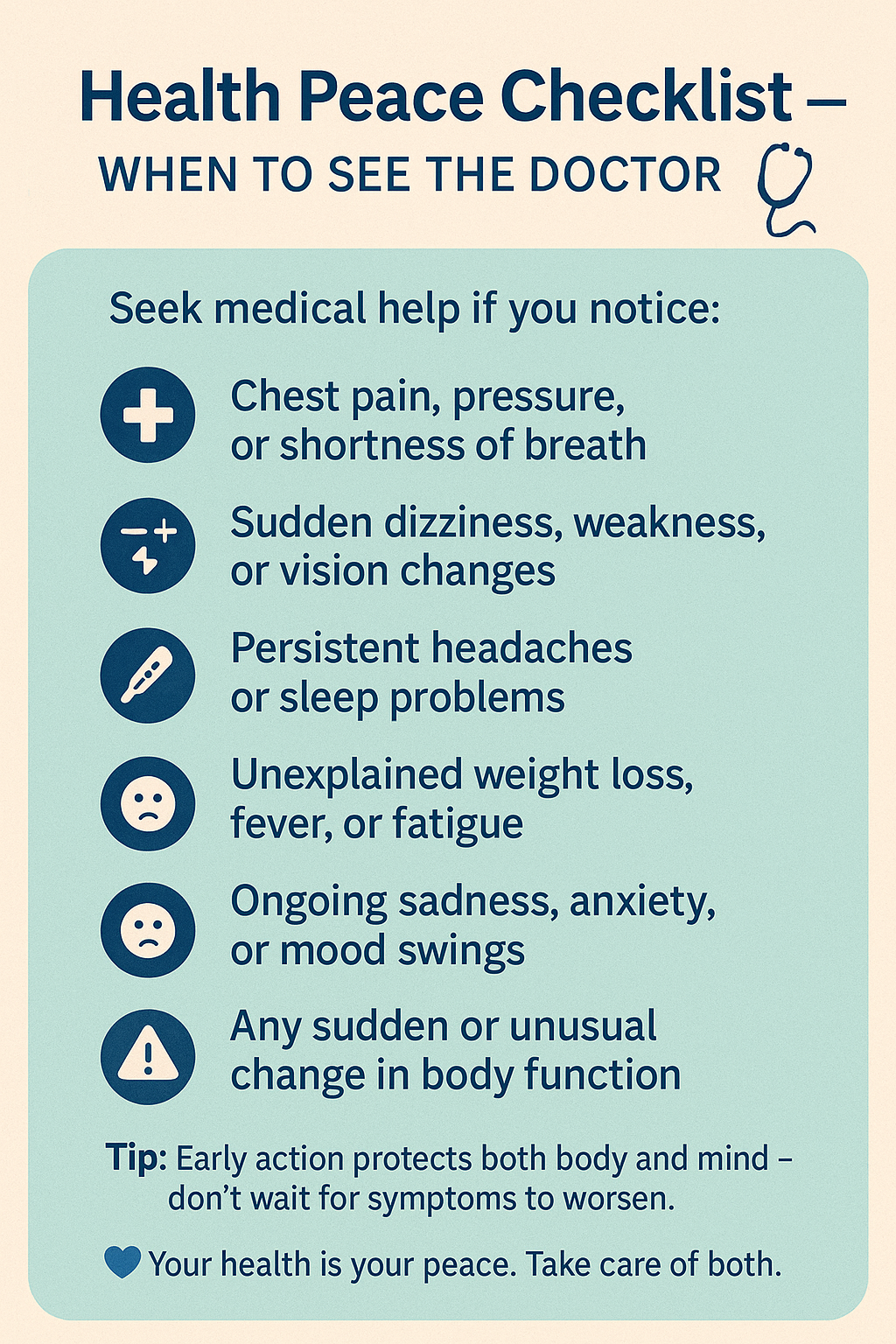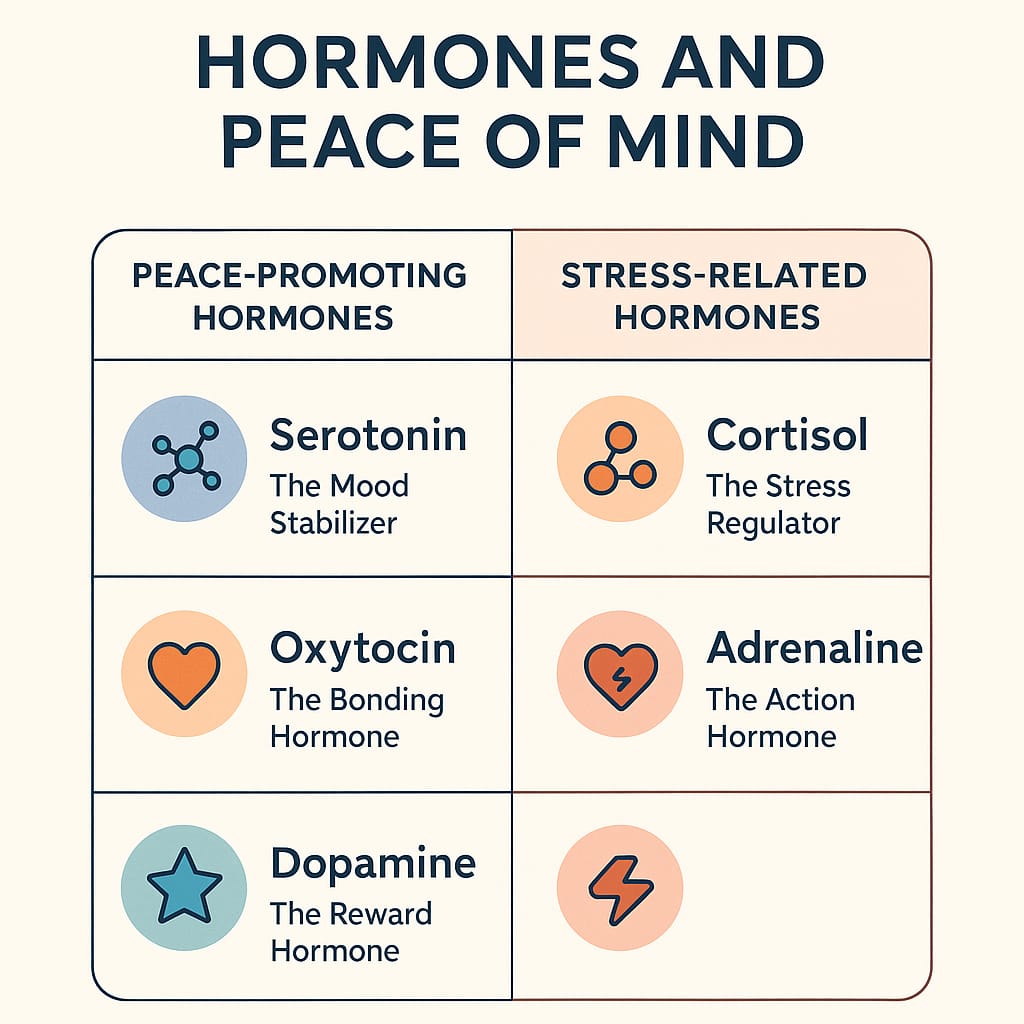How to Live in Peace? — Medical and Spiritual Aspects
Peace is not just the absence of conflict — it is a state of harmony within the body, mind, and soul. As a physician, I see every day how the stresses of modern life silently erode physical health, disturb emotional stability, and weaken spiritual resilience. True peace is a balance — a medical reality and a spiritual necessity. Let us explore both dimensions together.

Medical Aspects of Living in Peace
From a physiological standpoint, peace is the body’s “rest-and-repair” mode — governed by the parasympathetic nervous system. In this state, blood pressure stabilizes, breathing becomes steady, digestion improves, and the immune system works optimally. Conversely, constant stress triggers the “fight-or-flight” response, leading to elevated cortisol and adrenaline, high blood pressure, inflammation, sleep disturbances, and long-term risks like heart disease, diabetes, and depression.
Practical steps for medical peace:
• Regular Physical Activity
Moderate exercise — such as walking, stretching, or swimming — releases endorphins that counter stress hormones.
• Healthy Sleep Hygiene
Going to bed at a consistent time, keeping screens away an hour before sleep, and creating a calm bedroom environment help reset your biological clock.
• Balanced Nutrition
Diets rich in vegetables, fruits, whole grains, and lean proteins provide the nutrients the brain and body need for stable mood and energy. Avoid excess sugar, caffeine, and processed foods that trigger mood swings and anxiety.
• Mindful Breathing and Relaxation
Even 5–10 minutes of deep diaphragmatic breathing daily can slow heart rate, lower blood pressure, and improve mental clarity.
• Medical Check-ups
Prevention is peace. Regular health screenings detect problems early, reducing the anxiety of uncertainty.
Spiritual Aspects of Living in Peace
While medicine treats the body, spirituality nourishes the heart. Spiritual peace is not bound to one religion; it is about finding meaning, purpose, and connection beyond material life.
Core spiritual principles for peace:
• Gratitude and Contentment
Daily reflection on blessings — health, family, opportunities — rewires the brain towards positivity.
• Forgiveness
Letting go of resentment frees emotional energy. Medical studies even show lower blood pressure and better heart health in people who practice forgiveness.
• Connection with the Creator
Prayer, meditation, or silent contemplation create moments of deep mental stillness, calming the inner turbulence.
• Helping Others
Acts of kindness release oxytocin — the “bonding hormone” — which fosters feelings of joy and trust.
• Living by Values
Aligning daily actions with moral and ethical principles prevents internal conflict and guilt, replacing them with self-respect and inner calm.
The Intersection of Medicine and Spirituality
Medical science confirms that spiritual practices — such as meditation, prayer, and compassion — improve heart rate variability, lower stress hormone levels, and enhance mental well-being. On the other hand, a healthy body supports deeper spiritual focus by reducing distractions from illness and discomfort.
Peace is not something to be found in a distant place; it is cultivated inside — in the choices you make for your body, in the thoughts you nurture in your mind, and in the faith and values you hold in your heart. A healthy body makes it easier to have a peaceful soul, and a peaceful soul guides the body towards health.
If you liked the article, kindly share the link within your contacts circle.

When to See the Doctor?
While healthy habits and spiritual practices can greatly enhance peace of mind, there are times when professional medical help is essential. Seek medical attention promptly if you notice:
• Persistent chest pain, pressure, or shortness of breath
• Unexplained weight loss, fever, or fatigue
• Severe headaches, dizziness, or sudden vision changes
• Prolonged insomnia or disturbed sleep despite relaxation techniques
• Persistent sadness, anxiety, or mood changes affecting daily life
• Any sudden change in physical or mental function
Remember, seeking timely help is not a sign of weakness — it is an act of wisdom. Medical care can restore the physical stability that your mind and spirit need to remain at peace.
Hormonal Aspect of Peace of Mind
Our emotions and mental calm are deeply influenced by the balance of hormones in the body. Hormones act as chemical messengers, carrying signals between the brain and the rest of the body, and they play a central role in regulating mood, energy, and stress response.
1. The Peace-Promoting Hormones
• Serotonin — The Mood Stabilizer
Often called the “happiness hormone,” serotonin promotes feelings of well-being and emotional stability. Adequate sunlight, balanced nutrition (especially foods rich in tryptophan like nuts, seeds, and bananas), and regular physical activity boost serotonin levels.
• Oxytocin — The Bonding Hormone
Released during moments of trust, affection, and kindness, oxytocin fosters feelings of safety and connection — essential components of inner peace. Acts of compassion, hugging loved ones, and even spending time with pets can increase oxytocin.
• Dopamine — The Reward Hormone
Dopamine motivates us to pursue meaningful goals. Healthy dopamine balance, supported by adequate rest, balanced diet, and purposeful activities, leads to satisfaction without dependence on unhealthy rewards.
2. The Stress-Related Hormones
• Cortisol — The Stress Regulator
In small doses, cortisol helps us handle challenges. But chronic elevation from ongoing stress disrupts sleep, raises blood pressure, and fuels anxiety. Techniques like deep breathing, mindfulness, and moderate exercise help bring cortisol back to healthy levels.
• Adrenaline — The Action Hormone
Adrenaline sharpens focus in emergencies, but prolonged activation (due to constant stress) leads to restlessness, irritability, and mental fatigue. Learning to switch off this “emergency mode” is key to peace of mind.
3. Balancing Hormones for Calm
• Maintain regular sleep to support natural hormonal rhythms
• Eat balanced meals with proteins, complex carbs, and healthy fats
• Incorporate physical activity daily
• Practice stress-reducing habits like prayer, meditation, or deep breathing
• Spend quality time with supportive people
Hormones are the silent architects of our mental state. When they are in balance, the mind feels calm and focused; when they are disturbed, even small problems feel overwhelming. Taking care of your body’s hormonal health is, in many ways, taking care of your peace of mind.


By Dr. Mohammed Tanweer Khan
A Proactive/Holistic Physician
Founder of WithinTheBody.com
